September 1, 2010
Ched MacQuigg and I were prepared to video a two-camera documentation of the regularly scheduled September 1, school board meeting’s approval of the minutes of the committee meetings and in particular, the public comment period.
Former student, Caitlin O’Grady, above, was prepared to comment on having filed a complaint form, with the administration from which she’d never received a response.
O’Grady is now a University of New Mexico Nuclear Engineering Student. A couple of years ago, she was a student at Sandia High School and as a sophomore began taking advanced classes at Central New Mexico Community College, (page two) including high level mathematics. When it came time to plan graduation from Sandia, APS insisted she needed a calculus I class. She had taken higher levels of math at CNM and was actually tutoring students in calculus. The APS bureaucracy was unable to deal with an advanced student and could not grasp why she didn’t need to fill some obligatory square on their form.
By the time she went through Sandia’s commencement ceremony, she had already received her associates degree in engineering with honors from CNM.
 Upon arrival at APS headquarters, we were met by KRQE TV Videographer Robert Pugsley who was setting up for a live-shot in front of the north side’s main entrance of the APS twin towers.
Upon arrival at APS headquarters, we were met by KRQE TV Videographer Robert Pugsley who was setting up for a live-shot in front of the north side’s main entrance of the APS twin towers.
 Upon arrival at APS headquarters, we were met by KRQE TV Videographer Robert Pugsley who was setting up for a live-shot in front of the north side’s main entrance of the APS twin towers.
Upon arrival at APS headquarters, we were met by KRQE TV Videographer Robert Pugsley who was setting up for a live-shot in front of the north side’s main entrance of the APS twin towers.
As we walked towards the building, I caught the glimpse of no less than seven APS Police officers led by Acting Director Tellez, below middle, who along with Sgt. T.A. Mora, left, and Officer K.L. Green, right, moved to block and confront us. Tellez handed MacQuigg a sealed envelope.
 Tellez told MacQuigg that he would not be allowed in the building. When MacQuigg asked why, Tellez told him, read that, pointing to the envelope.
Tellez told MacQuigg that he would not be allowed in the building. When MacQuigg asked why, Tellez told him, read that, pointing to the envelope.
“You’re allowed in,” Tellez said, pointing at me.
“Who ordered you to keep me out,” MacQuigg asked Tellez. “You don’t take orders from the board,” he said, paraphrasing board policy.
Board Member Authority
Board of Education members shall have authority only when acting as a Board of Education in a regular, special, committee or emergency meeting. The Board of Education shall not be bound in any way by any statement or action on the part of any individual Board of Education member. No Board of Education member shall speak for or represent the entire Board of Education unless so authorized by the majority of the Board of Education.
 Tellez referred to the envelope, turned around and walked back into the building, leaving six officers, two standing directly between MacQuigg and the entrance, another two near the front doors, and a pair standing about 20 feet to our left, east of the front steps.
Tellez referred to the envelope, turned around and walked back into the building, leaving six officers, two standing directly between MacQuigg and the entrance, another two near the front doors, and a pair standing about 20 feet to our left, east of the front steps.
MacQuigg happened to have a copy of his retirement settlement agreement with him; it stipulates that he may be on APS property and specifically attend all school board meetings.
He asked the officers to call Chief Tellez back because of overriding language in his papers. An officer said, “You don’t need to talk to Tellez,” and refused to call him or provide a better phone number than through the switchboard.
He asked the officers to call Chief Tellez back because of overriding language in his papers. An officer said, “You don’t need to talk to Tellez,” and refused to call him or provide a better phone number than through the switchboard.
 I entered the building with my cameras and presented myself at the door to the John Milne Community Board Room. Two uniformed officers confronted me: Sgt. Mora, left, and Officer Green, and plainclothes Detective Gary Georgia, right. I was denied entry and they refused to recognize me as media.
I entered the building with my cameras and presented myself at the door to the John Milne Community Board Room. Two uniformed officers confronted me: Sgt. Mora, left, and Officer Green, and plainclothes Detective Gary Georgia, right. I was denied entry and they refused to recognize me as media.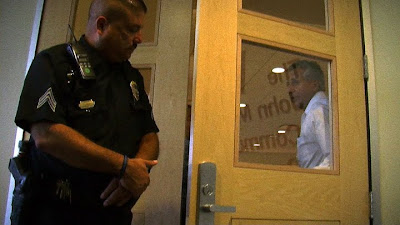 “You, specifically are not allowed in,” acting APS Police Deputy Chief Steve Gallegos, above right, said from inside the door.
“You, specifically are not allowed in,” acting APS Police Deputy Chief Steve Gallegos, above right, said from inside the door.
Lt. Alan Rider below, approached me and started a conversation about the Board ejecting and banning MacQuigg and me. He started speaking before I pointed the camera with its directional microphone towards him.
He clearly was attempting to goad me. However, he didn’t appreciate the answers he got to his questions.
“…The thing is, you know, as well as I do, what kind of problems we’re having,” Rider said.
“Yeah, the cause is at the front of the room, not the back of the room,” I said.
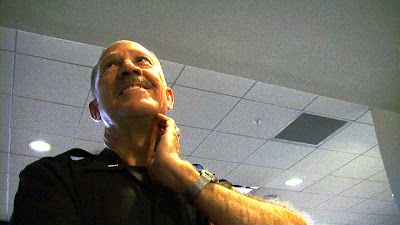 “Why are you banned,” Rider asked me?
“Why are you banned,” Rider asked me?
 “Why are you banned,” Rider asked me?
“Why are you banned,” Rider asked me?
“I’m not banned,” I said.
“Well, why is Chad (sic) banned,” Rider asked?
“They say because of a letter written in ‘09,” I said.
“And what does that letter say,” Rider asked?
I explained that MacQuigg was being banned for the content of his speech, that the board didn’t like what he was saying, and that was censorship.
“And how do you define censorship,” Rider asked?
“Not allowing someone to speak freely,” I said. “How do you define censorship,” I asked?
“When you are disruptive and causing trouble,” Rider said.
Wouldn’t that be disorderly conduct,” I asked?
“Probably, yeah,” Rider said, “so that’s why people get banned.”
“So, why haven’t you ever charged anybody,” I asked? “Person is innocent till proven guilty.”
“So, you say you want to be charged,” Rider asked?
“What I’m saying is…”
“Were you disruptive,” Rider asked?
I’m not disruptive,” I said, “but if you say I’m disruptive, then you have to prove that in a court of law.”
“Now you were a police officer, right,” Rider asked?
“I was,” I said.
“So you know what it’s all about,” Rider said.
“I absolutely know what it’s all about,” I said.
“Then I don’t need to explain it to you,” Rider said.
“What you’re doing is not what it’s all about,” I said.
“Well, that’s what makes this country great, right,” Rider asked?
In all criminal prosecutions, the accused shall enjoy the right to a speedy and public trial, by an impartial jury of the State and district where in the crime shall have been committed, which district shall have been previously ascertained by law, and to be informed of the nature and cause of the accusation; to be confronted with the witnesses against him; to have compulsory process for obtaining witnesses in his favor, and to have the Assistance of Counsel for his defence.
“I shouldn’t have to explain it to you,” Rider said.
“You don’t have to explain it to me, I know you don’t understand it,” I said as Rider turned and walked away.
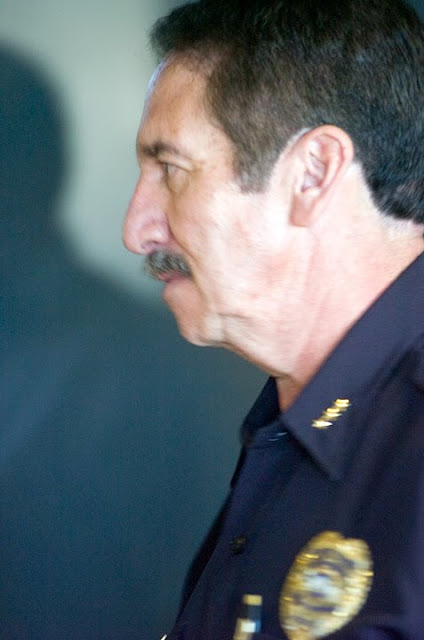 Tellez then walked by, I asked to speak with him about not getting into the room. His response, “Tomorrow Mark.”
Tellez then walked by, I asked to speak with him about not getting into the room. His response, “Tomorrow Mark.”
I emailed both Tellez and Gallegos seeking comment from them for this posting without response.
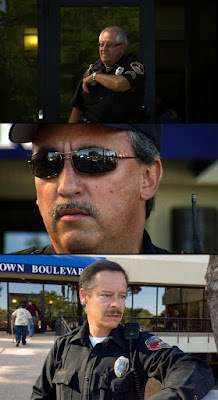 APS Police, Acting Sergeant Gil Cadena, top above and Officer Ken Santillanes, middle above images, Gallegos, Georgia, Green, lower above, and Tellez are all retired Albuquerque Police officers and know me from when we served on APD.
APS Police, Acting Sergeant Gil Cadena, top above and Officer Ken Santillanes, middle above images, Gallegos, Georgia, Green, lower above, and Tellez are all retired Albuquerque Police officers and know me from when we served on APD. Gallegos, above middle, standing, when he was an Albuquerque police violent crimes detective, at a suspected homicide scene near downtown, with Teresa Wadley, a representative from the office of the medical investigator, left, his Lieutenant Richard Tarango, and Criminalistics Detective Jim Galloway.
Gallegos, above middle, standing, when he was an Albuquerque police violent crimes detective, at a suspected homicide scene near downtown, with Teresa Wadley, a representative from the office of the medical investigator, left, his Lieutenant Richard Tarango, and Criminalistics Detective Jim Galloway.
Officer M.S. Pittel and Lt. Rider were Bernalillo County Deputy Sheriffs. They are all well aware that I am a member of the media.
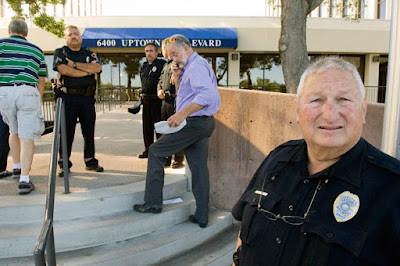 Pittel, above right, engaged me in light banter about the good old days. I’m not sure if it was an innocent distraction or more intentional as he didn’t make any mention of what was happening.
Pittel, above right, engaged me in light banter about the good old days. I’m not sure if it was an innocent distraction or more intentional as he didn’t make any mention of what was happening.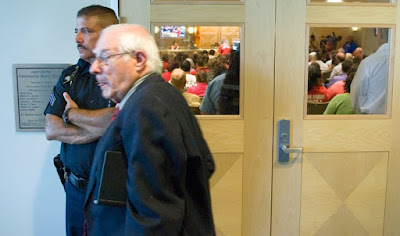 State Representative Tom Anderson, R – Bernalillo County, District 29, of the Westside of Albuquerque arrived and was initially turned away.
State Representative Tom Anderson, R – Bernalillo County, District 29, of the Westside of Albuquerque arrived and was initially turned away.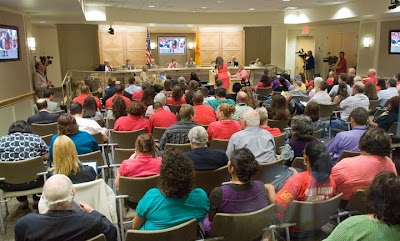 Anderson got into the room the next time the door was opened and found a seat. He is seen in the lower left of the above picture.
Anderson got into the room the next time the door was opened and found a seat. He is seen in the lower left of the above picture.Caitlin O’Grady, was never allowed to make her comment because the Board only listened to people addressing the issues from Rio Grande High School.
 So what’s wrong with this picture?
So what’s wrong with this picture? I was left to try to document the Board meeting through the windows of the doors I was barred from entering. In the the picture above, Board Secretary Dolores Griego, left, taking notes and Board President Martin Esquivel, right, working on his laptop pay scant attention to a citizen talking about the Rio Grande High School situation that took over the meeting.
I was left to try to document the Board meeting through the windows of the doors I was barred from entering. In the the picture above, Board Secretary Dolores Griego, left, taking notes and Board President Martin Esquivel, right, working on his laptop pay scant attention to a citizen talking about the Rio Grande High School situation that took over the meeting.
The letter to MacQuigg, signed by APS Board President Martin Esquivel and APS Acting Chief of Police Steve Tellez, shows that they are clearly acting beyond the APS Board Member Authority Policy.
The actions they take denying citizens from entering public meetings are without basis or any due process hearing to establish that a law has been violated justifying their actions.
If the actions contemplated in the Esquivel-Tellez letter, that were what Board member Robert Lucero suggested as the Audit Committee went into closed session and was discussed, as Board member and Audit Committee Chairman David Robbins stated on the record, then the results of being ejected and MacQuigg being banned were illegal acts.
 The questioning of issuing Esquivel-Tellez letter to MacQuigg was not on any agenda posted in accordance with the state’s Open Meetings Act. Click on any image to enlarge.
The questioning of issuing Esquivel-Tellez letter to MacQuigg was not on any agenda posted in accordance with the state’s Open Meetings Act. Click on any image to enlarge.
MacQuigg asked for the meeting, Esquivel required before letting him return to board meetings. Tellez proposed a date that was in conflict with an appointment MacQuigg already scheduled. Tellez indicated he would find a suitable date, but never got back. As the APS candidate forum approached APS Vice President Paula Maes sent a message indicating she was now going to handle the meeting Esquivel required. MacQuigg's lawyers entered the discussion and the meeting has still not taken place. MacQuigg has not been notified that he ban has been rescinded.
It would seem that not only was the letter illegal, but Esquivel and Maes have no intention of ever holding a meeting.
The full effect is that MacQuigg and I have been ejected and in spite the fact that when Tellez handed MacQuigg the letter and told me I could go into the board meeting I was not allowed in and Tellez would not talk to me about why I was being excluded.
The actions and conversations with ranking APS police officers, shows that they did not know the actual contents of the letter to MacQuigg.
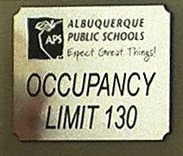 When Dep. Chief Gallegos physically barred me from entering the board room it was not based on the room being over crowded. The official posted occupancy limit is 130. The room is normally set up in nine rows of five chairs on either side of a center aisle for a total of 90 chairs for the audience, there are eight seated at the dais and six staffers in front of the dais.
When Dep. Chief Gallegos physically barred me from entering the board room it was not based on the room being over crowded. The official posted occupancy limit is 130. The room is normally set up in nine rows of five chairs on either side of a center aisle for a total of 90 chairs for the audience, there are eight seated at the dais and six staffers in front of the dais.
There were at least six photographers I could see along the walls, some accompanied by a couple of TV reporters.
There is a slight alcove in the back of the room where up to five people might congregate and usually a staffer at a desk, whom I believes monitors the web casting, which is produced from a separate room in the south west corner of the board room. I counted six vacant chairs. There were up to four APS Police/Security officers. The room had no more than 120 people in it, 10 fewer than the maximum-posted occupancy limit is 130.
There is a slight alcove in the back of the room where up to five people might congregate and usually a staffer at a desk, whom I believes monitors the web casting, which is produced from a separate room in the south west corner of the board room. I counted six vacant chairs. There were up to four APS Police/Security officers. The room had no more than 120 people in it, 10 fewer than the maximum-posted occupancy limit is 130.

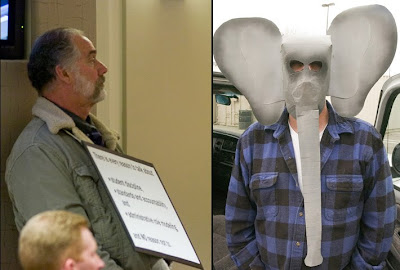 Esquivel referenced an earlier letter written in 2009, wherein he warned MacQuigg of breaking decorum by wearing signs and a mask, representing himself as the “Elephant in the Room,” and refusing to remove it when APS Police Chief Bill Reed ordered him to do so. Several Administrators, including Monica Armenta greeted MacQuigg by name, while he was wearing the mask.
Esquivel referenced an earlier letter written in 2009, wherein he warned MacQuigg of breaking decorum by wearing signs and a mask, representing himself as the “Elephant in the Room,” and refusing to remove it when APS Police Chief Bill Reed ordered him to do so. Several Administrators, including Monica Armenta greeted MacQuigg by name, while he was wearing the mask. Esquivel's earlier letter written November 5, 2009, explained that he was placing MacQuigg on notice because he refused to remove the mask when asked to do so and for: having made personal attacks that Esquivel considered out of order, for speaking out of order, for wearing a mask and refusing Esquivel's order to remove it, and for "unfairly" questioning the integrity of his colleagues. Esquivel wrote that MacQuigg shouted out responses and questions that Esquivel found "completely unacceptable." He went on to write:
Esquivel's earlier letter written November 5, 2009, explained that he was placing MacQuigg on notice because he refused to remove the mask when asked to do so and for: having made personal attacks that Esquivel considered out of order, for speaking out of order, for wearing a mask and refusing Esquivel's order to remove it, and for "unfairly" questioning the integrity of his colleagues. Esquivel wrote that MacQuigg shouted out responses and questions that Esquivel found "completely unacceptable." He went on to write:Speakers are told that personnel matters are not to be raised during meetings. Speakers are told that meetings are not the place to interrogate Board members. Yet, you ignore these requests and continue to do so. While you are certainly welcome to you opinion, I have no tolerance for actions that are disrespectful toward elected officials and public servants.
Esquivel goes on to write about past and present Board members, and himself meeting with MacQuigg "despite personal attacks". He then draws his own "personal opinion" about why MacQuigg engages the School Board, disregarding the simple straight line basis for honest, accountable government leadership.
Though Esquivel claims to have listened to MacQuigg, he'd rather make it an issue that MacQuigg is upset by his settling to leave APS employment. MacQuigg isn't happy about how he left APS, but that is not what is driving him; the issue of the corruption in the APS leadership is his driving motivation. Esquivel can't touch the topic because it is a third rail for him and any acknowledgement, on his part, of the issue is instantly lethal to his position on the board.
Esquivel writes:
Though Esquivel claims to have listened to MacQuigg, he'd rather make it an issue that MacQuigg is upset by his settling to leave APS employment. MacQuigg isn't happy about how he left APS, but that is not what is driving him; the issue of the corruption in the APS leadership is his driving motivation. Esquivel can't touch the topic because it is a third rail for him and any acknowledgement, on his part, of the issue is instantly lethal to his position on the board.
Esquivel writes:
I have tried to listen and communicate with you, but I have now determined that you lack the ability to be rational and respectful in a manner necessary to have any constructive conversations.
It doesn’t seem to bother Esquivel, who claims his day job is as a civil rights lawyer, that the U.S. Supreme Court has upheld the wearing of signs, masks, and even heckling as protected forms of free speech. In the absence of a clear and present danger of violence, such acts may not be suppressed.
I have never seen or heard MacQuigg heckle at a Board or committee meeting.
However, there are times when a man of conscience must speak out in the face of the use of wrong, corrupted or manipulated statements of fact. In the nearly four years of covering the APS Board and their committee meetings I had not uttered a word publicly until I was ordered to move my video equipment twice and upon the ejection order.
For insistence upon compliance with the law, I am deemed "hostile?"
I was not hostile. I made no demands, nor was I disrespectful, nor used fighting words; ultimately I acquiesced.
Even in the state courts where cameras are allowed, if a judge determines that a hearing must be closed, excluding cameras, the court must permit a hearing to allow any media present or interested to make its case against closing the courtroom.
The Open Meetings Act doesn't allow the banning of audio and video recorders, but requires that reasonable accommodations be made for their use. By ejecting MacQuigg and me for my use of recording devices, especially without even listening to the legal reasoning for not banning us, is more deplorable.
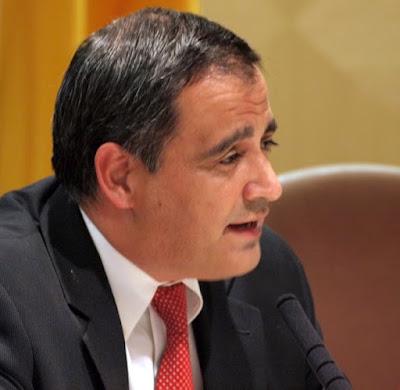 Esquivel is correct when he wrote, "I have no tolerance for actions that are disrespectful toward elected officials and public servant." He also could not be more wrong. As an elected official and public servant, it is his duty and responsibility to be tolerant. Elected officials and public servants, may demand respect, but the only way they will be granted any respect is to earn it by first being respectful and tolerant of the citizens they serve.
Esquivel is correct when he wrote, "I have no tolerance for actions that are disrespectful toward elected officials and public servant." He also could not be more wrong. As an elected official and public servant, it is his duty and responsibility to be tolerant. Elected officials and public servants, may demand respect, but the only way they will be granted any respect is to earn it by first being respectful and tolerant of the citizens they serve.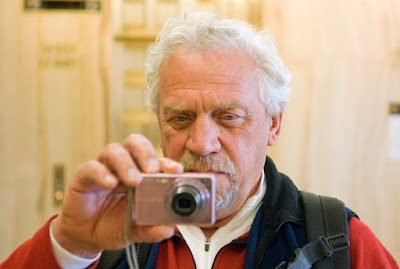 Jon Knudsen, above, writes under the name Johnny Mango for Duke City Fix, on January 25, 2011, he posted, APS District 4: Four Interviews and a Forum.
Jon Knudsen, above, writes under the name Johnny Mango for Duke City Fix, on January 25, 2011, he posted, APS District 4: Four Interviews and a Forum.
In his interviews, Knudsen wrote:
MacQuigg stated that Board member Esquivel had him banned from board meetings--an allegation that Martin Esquivel denies.
The greater point that Esquivel misses, is when he writes that: speakers are told that personnel matters are not to be raised during meetings and speakers are told that meetings are not the place to interrogate Board members. The words "speakers are told" constitute the First Amendment prohibition by government by abridging "Free Speech."
Esquivel, the board, administrators, and APS police are in need of a reminder of our controlling documents:
The First Amendment of the United States Constitution
Congress shall make no law respecting an establishment of religion, or prohibiting the free exercise thereof; or abridging the freedom of speech, or of the press; or the right of the people peaceably to assemble, and petition the Government for a redress of grievances.
Section 17 of the New Mexico Constitution:
Every person may freely speak, write and publish his sentiments on all subjects, being responsible for the abuse of that right; and no law shall be passed to restrain or abridge the liberty of speech or of the press. In all criminal prosecutions for libels, the truth may be given in evidence to the jury; and if it shall appear to the jury that the matter charged as libelous is true and was published with good motives and for justifiable ends, the party shall be acquitted.
The specific points that need to be pointed out are:
...or the right of the people peaceably to assemble, and petition the Government for a redress of grievances.
Every person may freely speak, write and publish his sentiments on all subjects...
The problem is compounded by the fact that there is no place provided to raise personnel matters or to interrogate Board members.
Even if there were such a place for citizens to publicly express concerns about personnel matters, or to publicly interrogate Board members holding them accountable, there is no better place to discuss these issues than in the harsh light of the public forum. Any elected or appointed official or public servant who suggests otherwise indicts themselves as unqualified to serve the public. Those who serve the public must always stand for questions from taxpayers about their work. Those wanting to serve the public must be willing to account for themselves. If they won't, they forfeit their public standing.
The Board of Education is not permitted to become directly involved in personnel matters, yet that should in no way prohibit a citizen from expressing their concerns at the public forum. The board would be well served to listen to what is going on at the lower administrative levels.
The one role the board does have in personnel matters is the selection and retention of the superintendent. If the superintendent's ability or inability to handle the personnel is reflected in the comments of concerned citizens, then the board members should take what they hear into consideration when they make the determination regarding the superintendent.
It seems easier for Esquivel to cast aspersions on MacQuigg than to openly and honestly discuss his concerns.
Esquivel seems fond of attacking people who bring a message he is unwilling hear by being condescending towards them, calling them names and characterizing them as having an agenda.
In a November 23, 2010, article by Journal Staff Writer Hailey Heinz, "'Get a Life': Testy Times at APS," Heinz reported that Esquivel wrote a Wichita, Kan., woman, Cindy Duckett, "to get a life." Heinz described Duckett as "a parent and school gadfly." who had experienced then Wichita School Superintendent Winston Brooks', temper, wrote the APS Board about Brooks having displayed his temper with an anti-tax advocate over a bond issue.
"You sound like a nut job, so stop e-mailing me," Esquivel wrote Duckett. He found resurrecting a decade old issue inappropriate, he told Heinz.
Heinz quoted Esquivel, "I have details about this person and things she was saying, and feel that her motive was malicious and she had an ax to grind,"
Through interviewing several people who have requested anonymity for fear of retaliation or retribution, I am aware of Brooks' temper. These sources have either been shouted at or physically bumped. Brooks uses his body rather than his fists or hands to barge into people.
Trying to diminish people who question Brooks or the school system is a common refrain for Esquivel.
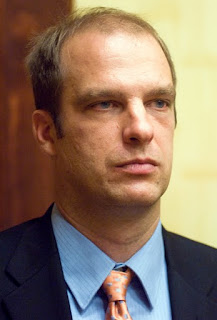 "I think this organization has a right-wing agenda with an ax to grind," Esquivel told KOAT TV Reporter Lacy Crisp of a study released by the Rio Grande Foundation's President Paul Gessing, left, stating that the school system's per pupil funding had raised by 33 percent over inflation, citing U.S. Census figures.
"I think this organization has a right-wing agenda with an ax to grind," Esquivel told KOAT TV Reporter Lacy Crisp of a study released by the Rio Grande Foundation's President Paul Gessing, left, stating that the school system's per pupil funding had raised by 33 percent over inflation, citing U.S. Census figures.
"this study has an agenda, it has no basis in fact and it basically is an attempt to garner attention for an organization that doesn't have any credibility." Esquivel said.
The link to KOAT Channel 7, “Union President Offers Budget Solutions,” January 12, 2011, in the RGF study will not take you there, but this link will.
Esquivel's default defense is to lash out, he has called several people "nuts," or "nut cases," and everybody, to him, has an ax to grind. He accuses critics of having an agenda as if having any agenda, differing from his agenda, is a bad thing.
"In retrospect, I should have just ignored her," Esquivel told the Journal. "I'll count it as a lesson learned."
What is so surprising is that Esquivel ignores so many other requests to be open forthright and candid, that when he shows he true propensity, he now thinks it would be best to ignore people.
Despite the fact that a comment came from Kansas, the woman had as much right as any Albuquerque citizen to express themselves without a government bully lashing out at them. If Esquivel weren't a bully and disagreed with her comments, his best route would have been to thank her for her interest and then ignore her. Unfortunately, doing so, wouldn't have let us see him accurately.
I contacted Esquivel seeking comment on this series. He responded, asking for more information and I forwarded four questions for him. He did not respond.
About half of the 30-officer APS Police Department were assigned to the board meeting.
 Members of APS Police Union, the Educational Police Officers Association, announced on September 28, 2010, of having taken a vote of no confidence, in Acting Chief Tellez and Acting Deputy Chief Gallegos.
Members of APS Police Union, the Educational Police Officers Association, announced on September 28, 2010, of having taken a vote of no confidence, in Acting Chief Tellez and Acting Deputy Chief Gallegos.
There were several reasons the vote was taken.
Part of the reason for the vote was based an injury that occurred when Tellez ordered a janitor to unlock a classroom door during a February 12, 2010, lock-down situation at Sandia High School.
According to press accounts at the time and officers familiar with the situation who spoke on condition of anonymity for fear of retaliation or retribution, the teacher, inside his classroom filled with students, not having received an all clear signal, hit the janitor in the ribs with a metal flashlight when he opened the door, while Tellez stood by silently.
Tellez, violating procedures and the police practice of announcing his presence and intention, was trying to deliver a message to the son of the woman who worked at APS, who officers had complained about in their vote of no confidence. The janitor was injured severely. No action was reportedly taken against Tellez.
Attempts by KRQE TV Reporter Alex Tomlin, to reach Tellez and his then Chief, Bill Reed for comment went unanswered.
Tomlin reported:
An APS spokesperson said this was just an accident and that it's not a story.
It seems like a story to the officers who understand the procedural violations and are affected by the favoritism shown by Tellez towards a non-departmental APS staffer to the disadvantage of officers to attend a limited training opportunity.
Several rank and file members have told me on the condition of anonymity they recognize they are being required to perform duties which they feel are breeches of the law and are violating constitutional rights. They each said they do so in order to keep their jobs and make a living to provide for their families.
I attempted to get interviews with APS acting Police and Deputy Chief of Police Steve Tellez and Steve Gallegos, but they did not respond to e-mailed requests.
 A few years back the Council of the Great City Schools, conducted a leadership audit of APS after a scandal of the Maintenance and Operations scandal.
A few years back the Council of the Great City Schools, conducted a leadership audit of APS after a scandal of the Maintenance and Operations scandal.
 A few years back the Council of the Great City Schools, conducted a leadership audit of APS after a scandal of the Maintenance and Operations scandal.
A few years back the Council of the Great City Schools, conducted a leadership audit of APS after a scandal of the Maintenance and Operations scandal.
In their report, the council described a culture of fear of retaliation or retribution by administrators.
In reporting for this post almost everyone associated with APS had a story to tell, but did not want to go on the record for fear of retaliation or retribution. I have never reported an issue where more people were willing to talk yet requested anonymity.







No comments:
Post a Comment